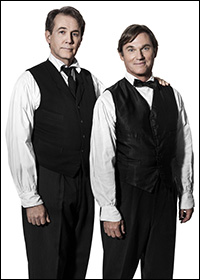
*
In an age of rampant corporate chicanery and political scandal, Americans are ripe for a good Ibsen-style moral scolding. And so Manhattan Theatre Club has lined up a new staging of one of the Norwegian dramatist's most stinging dramatic rebukes, An Enemy of the People. In the 1882 work, the once respected Doctor Thomas Stockmann becomes a public pariah when he points out that the local water that will feed the town's projected tourism cash-cow — public baths on which a ton of public and private money has been spent — is, in fact, contaminated. No one wants to hear this news, least of all Thomas' mayor brother, Peter. British playwright Rebecca Lenkiewicz penned the new adaptation, which gets its American premiere in a production directed by Doug Hughes and starring Boyd Gaines as the good doctor and Richard Thomas as the mayor. Lenkiewicz, who is juggling commissions from MTC and the National Theatre, talked to Playbill.com about how little has changed in 130 years.
When did you write this particular adaptation?
Rebecca Lenkiewicz: A few years back for the Arcola Theatre. They asked me to do it.
Was Ibsen a particular favorite of yours?
RL: Yes. I like him a lot. I'd written original plays for the Arcola before and we wanted to do an adaptation together, so we decided to do an Ibsen.
Do you know Norwegian or did you get someone to do a literal translation of the play first?
RL: I only know one word of Norwegian. The word for "ghost." That's it. How did you approach the job? How did you make the story palatable for audiences of today?
RL: I'd seen the play before. I read it and reread it. I just did it line by line, really. It grows much like one's own play. You get into the psychology of the characters and get under their skin. It takes a while to be in it. It's a few scenes before you're in it truly. You have to try to make it your own in a way, without distorting the original. It's about rhythm, really, the rhythm of the characters speaking to each other. I wanted it to feel very present and modern and not at all antiquated.
Is this only the second presentation of your adaptation?
RL: This is the second.
 |
||
| Boyd Gaines and Richard Thomas |
||
| Photo by Henry Leutwyler |
RL: Yes. I tinkered with it quite a lot the past few weeks, and then in rehearsal, usual the literal translation. Maybe something I left out before I reinstated. It's been pretty collaborative.
It's a famous play, obviously, and one that has a timeless theme. However, Ibsen has a stern morality that American audiences of today perhaps don't cotton to. How do get past that barrier where the audience feels that they are being preached to?
RL: Well, I don't want it to be just a morality play. If you look just under the surface of it, you'll find it's very much about human frailty, and it's not about being judgmental. It's about how people negotiate the world together. Doctor Thomas Stockmann, around whom the play revolves, and his brother Peter — I think they're very flawed individuals. They're brothers with a primal sibling rivalry and they both have huge flaws.
What is Dr. Stockmann's flaw, in your opinion?
RL: There's ego, there. I think there's selfishness. I think there are things that would make it very hard to live with him as a man, a single-mindedness.
I imagine you've had some conversations with director Doug Hughes.
RL: We've talked a lot. I think he's very brilliant and the atmosphere in the rehearsal room is fantastic, really electric. Everyone is incredibly intelligent and open. It's an open way of working. He strikes me as a director that doesn't have the monomania that some directors do. It's about working together, which is really lovely.
Are you working any other new plays?
RL: I'm working on an original play for Manhattan Theatre Club about Madame Curie. That's in the final rewrites. Hopefully, I'm getting there. And I've got a commission from the National Theatre here. What is your approach to the Curie story?
RL: It's very much about being a woman in that time, really. And also of overview of her daughter, Eve, who was born in 1903 and died in 2007. She was 104. It covers the span of that as well, or what happened in 104 years with all that science and brilliance. Eve's a character in the play, almost like a narrator. She's very present. It's about the sacrifices people make when they're that driven. And also the turnaround in France. Curie went from heroine to she-devil, because she had an affair with a man after her husband died. It's about how the public can swing, too. She wasn't even Jewish, but her middle name was Salome, and after the Dreyfus Affair, the French just pounced on anyone who was foreign and supposedly dirtying their waters.









